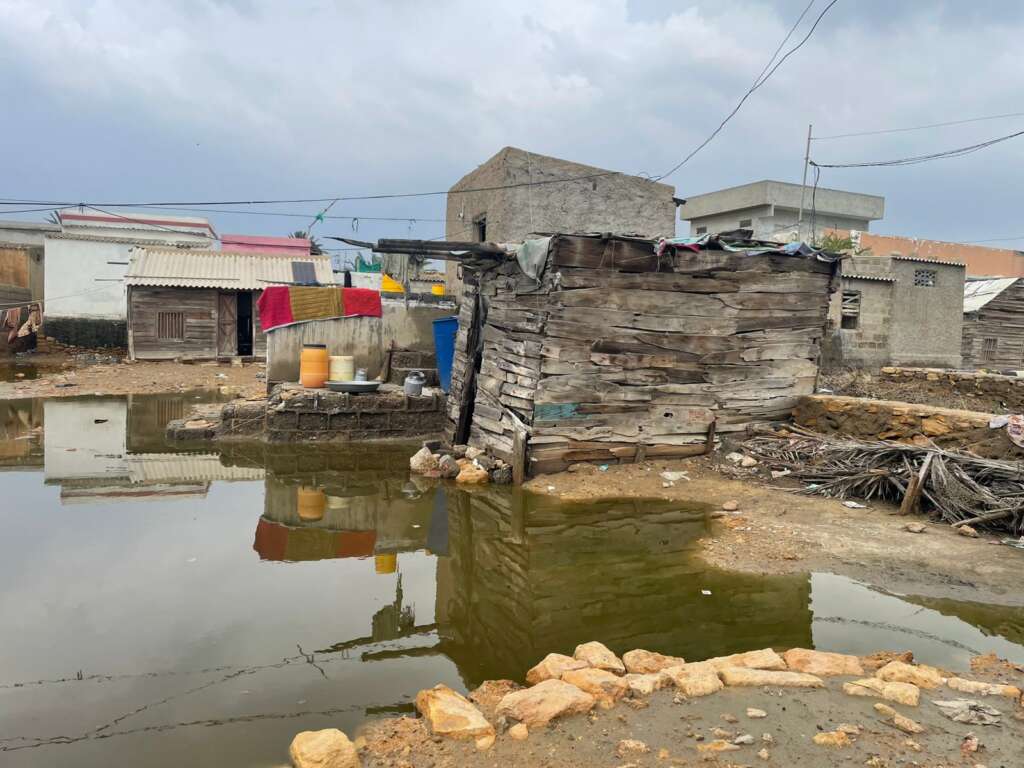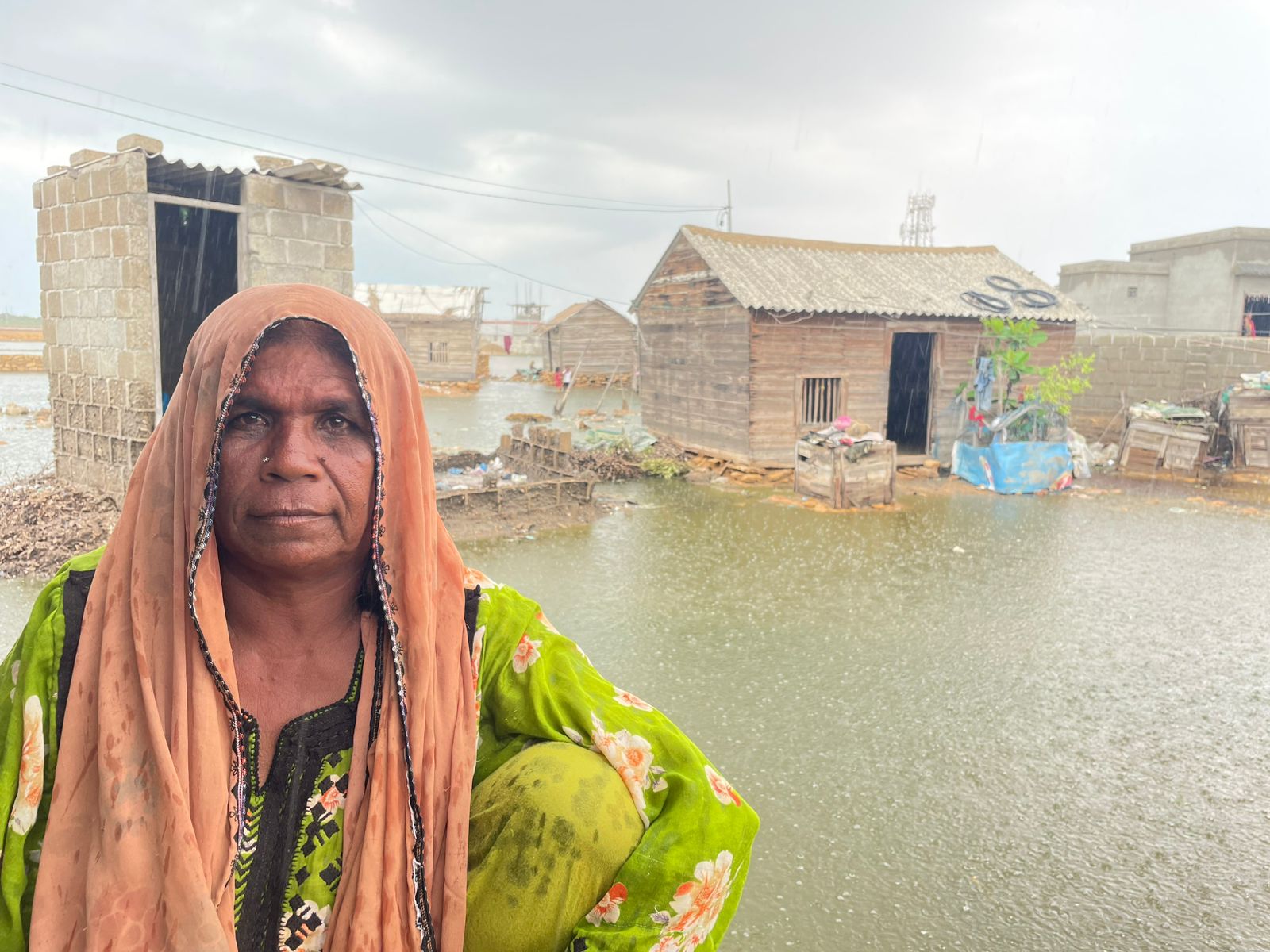On the morning of 19 August 2025, as Karachi drowned under torrential rain, 50-year-old Sabzi stood by the doorway, her chadar wrapped tightly around her head. The water was rising inside her home, but her eyes were fixed elsewhere. That date 19 August, was carved into her mind. It was the day she had to appear before the High Court of Karachi, carrying the weight of her petition for her two sons, both forcibly disappeared. The flood threatened her home, but Sabzi knew she could not stay back.
Sabzi is the mother of ten, living in the Baloch-populated settlement of Mauripur in Karachi. Five of her children are sons, five are daughters. Two of her daughters are married, and one of her sons too—his wife now seven months pregnant, while he himself remains among the forcibly disappeared.
That morning, Sabzi set out with her younger daughter, Gul Sida, who had completed matric and could guide her through the Urdu proceedings of the court. A friend of Gul Sida’s accompanied them. The rain had not stopped. They stood by the main road of Mauripur Staff, waiting. No buses appeared, the street ahead blurred by sheets of water. After what felt like hours, a Shiraz bus emerged through the storm. They climbed aboard as though it were a small miracle.
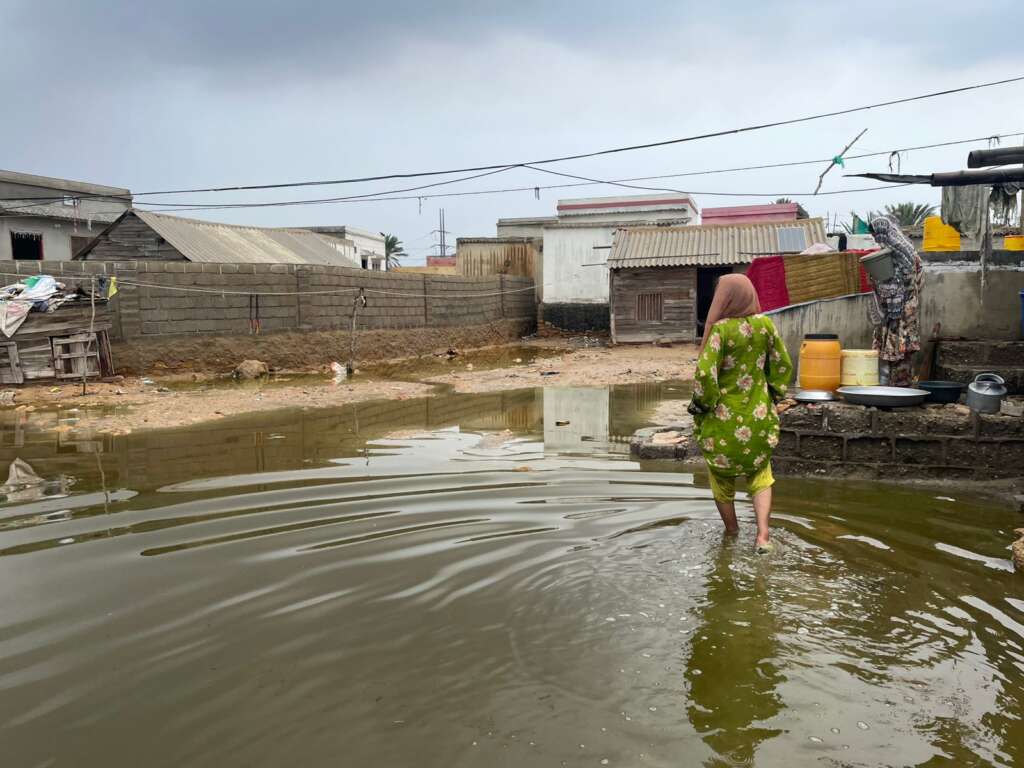
The bus was already overflowing. Passengers pressed together, water pooling inside the bus. Sabzi and the girls stood in the crush, drenched, swaying, until finally they reached the court. There, they were told the date of the hearing had been moved to this 9 September.
They said nothing on the way back. Their clothes clung to them, heavy with rainwater. “We were stuck in traffic for hours,” Sabzi recalled. “My head felt so heavy due to water continuously dripping on it. But it didn’t matter, not at all. For my sons… God knows what torment they are facing.”
When Sabzi returned home that evening, there was nothing left but water. Her three small rooms—built from wooden planks like those used for sea boats and laanch—were half submerged. The walls suffocated under the weight of things tucked into every corner: pots, bedding, utensils, the water pots from which the family drank. There were no storerooms, no boundary walls, no gates. The compound was open, exposed to the eyes of anyone passing. Three rooms, a kitchen, a public washroom, and a small space for two goats—now kept in a neighbour’s house because of the flood.
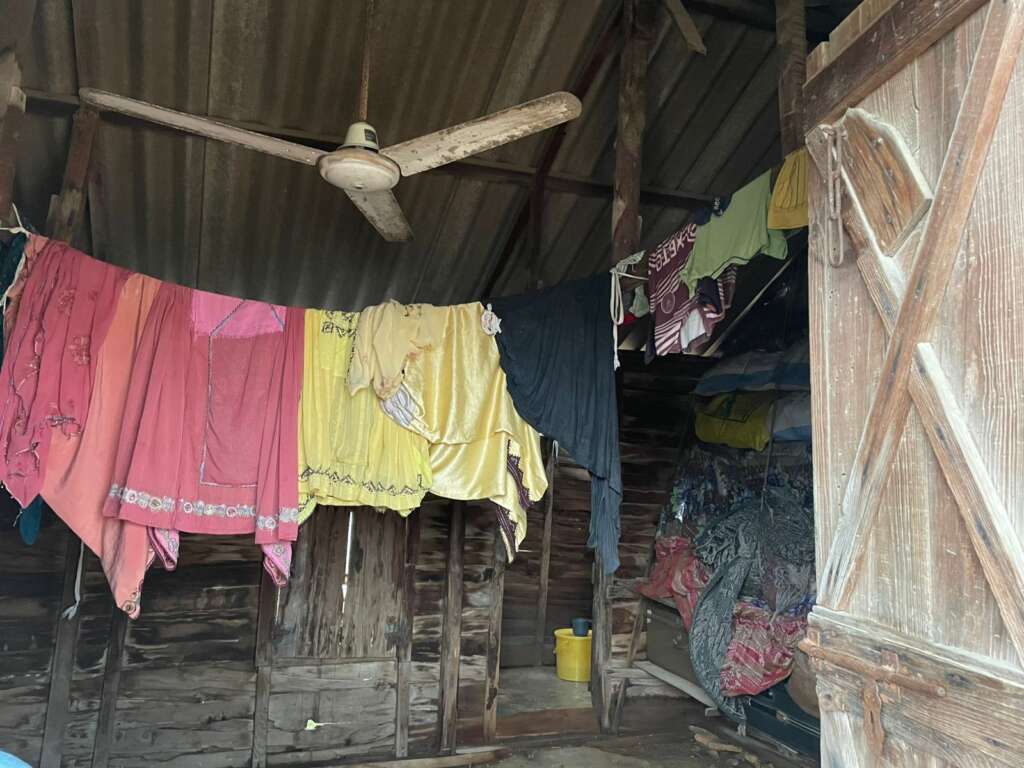
That day they could not cook. All their energy went into pushing water out of the rooms, though the compound itself remained under a pool of rainwater. To reach any of the three rooms, one had to wade through it. At night the water became unbearable, a constant itching that rose from their feet and spread through the body. Mosquitoes swarmed, multiplying with the rains, making sleep impossible.
Amid this discomfort, Sabzi’s mind never left her sons. “In the middle of night, even if I hear a dog barking in the distance,” she said, “I feel like maybe they are barking because someone has come—and I believe maybe those people are my sons. I go and see. There is nothing. I come back.”
Flooding, she added, was nothing new. Every time it rained, water filled the compound. It would take nearly a month to clear it, and they did it on their own.
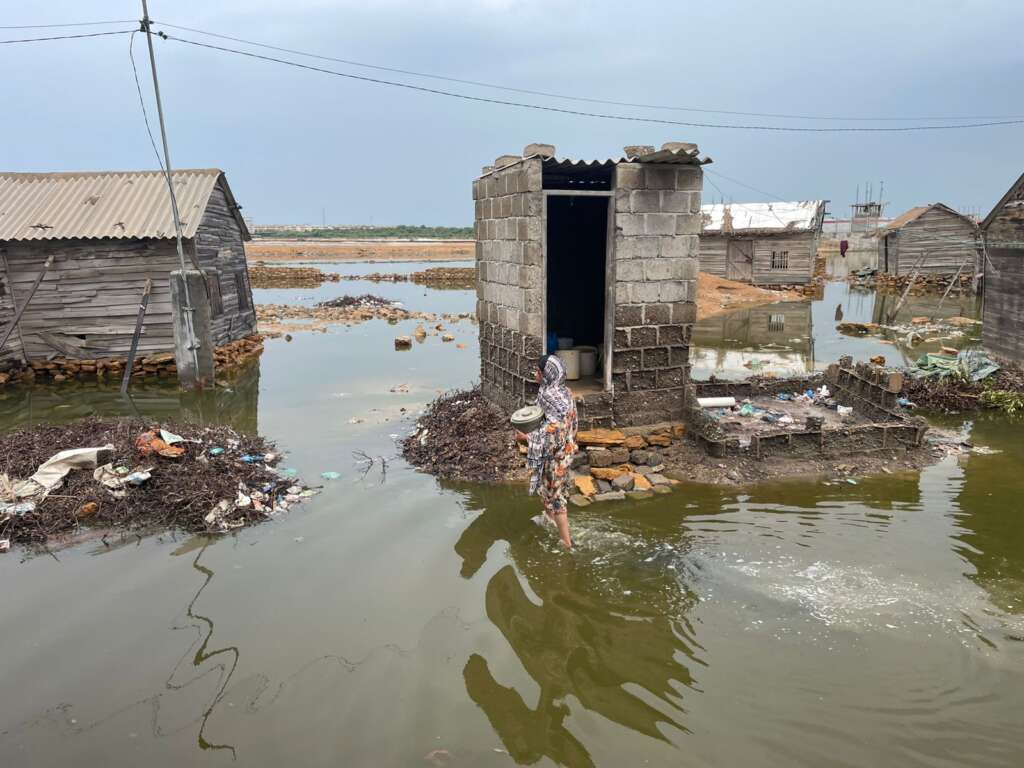
On 23 May 2025, Sabzi’s two sons – Shiraz, her eldest, and Selaan, her youngest were enforcedly disappeared by CTD (Counter Terrorism Department).
Shiraz’s wife, Shaeena, who is now pregnant with their first child, says she can never erase the sight from her mind. “It has been three months,” she said, “but when I close my eyes to sleep, I see them [Forces] still – clear, sharp, right before me.”
That night, around 3 a.m., the family was asleep when a knock rattled their door. Shiraz opened it. Within seconds, more than fifteen tall men in civilian clothes, their faces masked, poured into the small room. They carried weapons, crowding the space until Shaeena felt she could not breathe.
They demanded Shiraz’s original CNIC. When he handed it over, they ordered him outside. Shaeena remained in the room as the men searched through her belongings. “It was terrible,” she recalled. “To be surrounded by so many huge men with weapons. I wanted to step out, but there was no space. I hesitated to even speak.”
When the search yielded nothing, she followed them out. In the compound she saw Selaan. Panic rose in her chest. “Where are you taking them?” she asked. The reply came cold: “We are here for investigation. After some questions, they will come back.”
At first she believed them. In Mauripur, raids had become routine, forces storming homes under the pretext of searching for mawa or ghutka. Families had learned to endure these intrusions, knowing the men would leave once nothing was found.
But within minutes, the truth became clear. These were not for a “mava’ raid, they were from CTD. And that night, before Shaeena’s eyes, her husband and brother-in-law were forcibly disappeared.
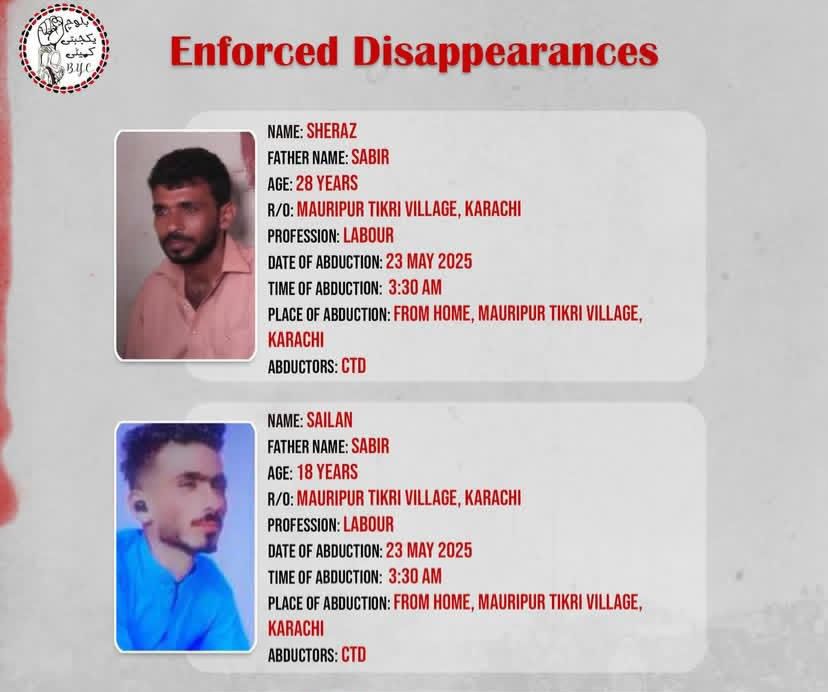
Twenty-eight-year-old Shiraz worked at a warehouse in Mauripur, packing Maggi noodles. The job was never permanent. His wife explained that his income depended on the profit the seat earned: some months he brought home only 2,000 rupees, sometimes 5,000, and on rare occasions 10,000 – never more.
His younger brother Selaan supplied eggs to shops in the neighborhood. Whatever he earned, Sabzi said, he used to pay the electricity and water bills. “It’s been years since there has been any water supply in Mauripur,” she explained. Families buy water from tankers. On days when Selaan earned enough, they could afford one. On days he did not, the family carried buckets, two buckets for 50 rupees from a far-off source.
On the night he was disappeared, eighteen-year-old Selaan had returned around 2 a.m., exhausted after finishing his egg supply round. He was asleep when the CTD forces stormed the house. His original CNIC, too, was taken.
That night, a neighbour’s thirteen-year-old son was also in the house. For weeks, his mother had been sending him to sleep there because his father, bedridden with falij (paralysis), would writhe in pain at night, and she feared the boy would be traumatized.
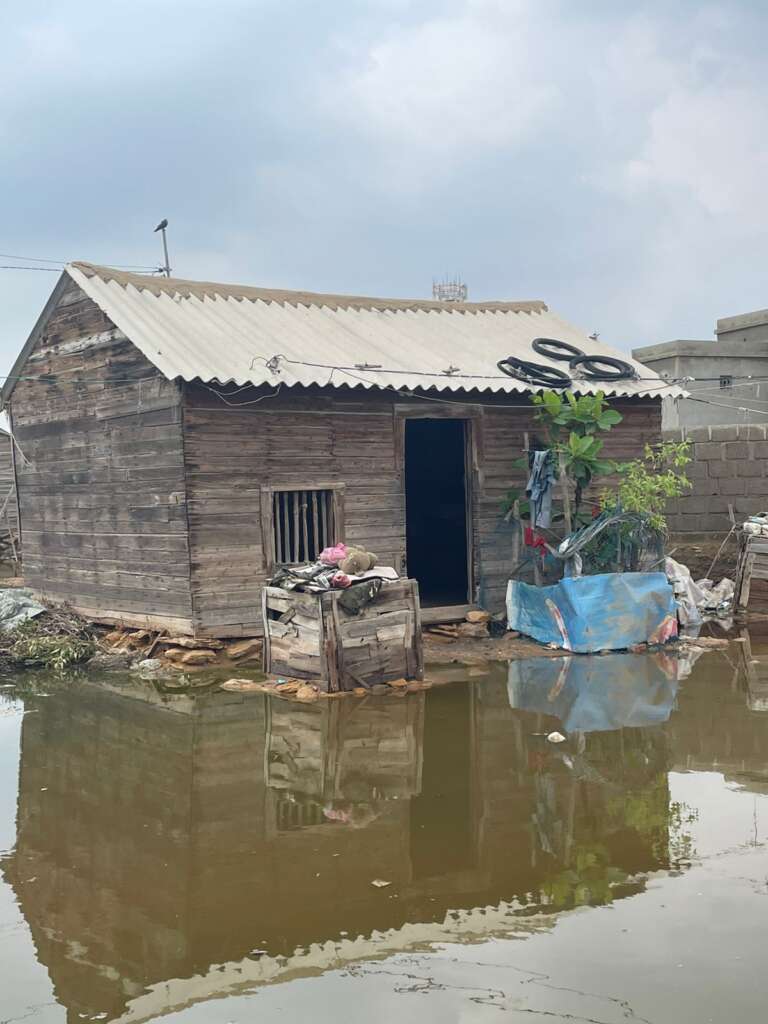
The raid broke him. Startled from sleep, he was interrogated at gunpoint and could only stammer that he was a neighbour. In the days after, his mother decided he was too disturbed to remain in Mauripur and sent him to relatives in Uthal.
When his father died few days ago in August, the boy returned briefly for the funeral. But even then, the kid mother shared, he was so distressed that he left immediately afterward. “He thinks what happened to Shiraz and Selaan could happen to him,” she explained quietly, “and nothing I tell him convinces him that the forces might spare children.”
Sabzi recalled that in 2019, Shiraz suffered a terrible accident that shattered his left knee. He was operated on at Bantva Hospital in Kharadar, where doctors fixed a raad (metal rod) in his leg. Later, another surgery was performed to remove the screws, but the rod remained. A final operation was scheduled for June this year to remove it. “Allah knows in what condition he would be now,” Sabzi said. “He always had trouble with that knee.”
Sabzi kept returning to the memory of Shiraz’s accident. He had been operated on twice, admitted for days in the hospital — unconscious, unable to move, his eyes closed, his knee shattered, bruises covering his body. When he did regain consciousness, she said, he writhed in pain. “But he was before my eyes,” Sabzi recalled. “I could see him in all his pain.” Now, she said, he is in a dungeon somewhere. “People say those who are taken are tortured. Some say the forces put their boots on their feet. Shiraz’s knee was already in pain. What would he be suffering now, when he is not before my eyes — and I cannot do anything about it?”
The day I interviewed her – August 20, it was raining again. Around two in the afternoon, Sabzi looked up at the sky. “I pray to Allah to keep me sane,” she said. “In this terrible pain, I ask for sabr [patience] until my sons return safely. And the way my heart trembles for my beloved sons, may those who took them feel the same, may they too be separated from the ones they love.”
As she spoke, I turned to the doorway. Her younger daughter stood ankle-deep in the flooded compound, rain still falling on her shoulders. The clothes they had hung outside to dry were drenched once more; she gathered them in her arms and carried them back and hanged them inside the cramped room.
Sabzi regrets that the night her sons were taken, neither she nor her husband was there.
Her husband, Sabir, is a fisherman in his mid-fifties. He is diabetic, a cardiac patient who has already undergone surgery after two of his heart vessels were blocked. Sabzi said she is glad he was not present that night “If he had seen it, with his heart condition, who knows what would have happened.”
When Sabir returned home two days later, they told him about his sons’ disappearance. For three months, he could not bring himself to go back to sea. He works on a laanch, journeys that sometimes last a month, sometimes two. He kept waiting, believing his sons might return. They did not. Their financial condition worsened. On August 18, the day before the rain, Sabir finally left again for the sea. “Forgive me, Sabzi, for leaving you in this ordeal,” he told her. “But I must, to keep us alive. Once my sons return, ring the sailor. Keep calling until the line is in range. I will come back.”
For Sabzi herself, the regret is unbearable. She was not at home that night. Her married daughter, who lives in Bungalow, another coastal area across Hawksbay, had asked her to stay over with her in-laws for a day. “I never leave my children even for a day,” Sabzi said. “But that time, I was compelled.”
The next morning, she received a call telling her to return immediately. When she reached home, she learned of the raid. “I wish I had been there,” she said. “Even if they [forces] had placed their toopak’ [rifle] at my chest, I would have borne it. If they had fired, I would have embraced the bullets. But I would not have let my sons be taken like that.”
Neighbors later told her that her resistance would have been futile that the [forces] are too powerful, that they would only have slapped her into unconsciousness. Sabzi shook her head. “If I had lost consciousness, at least I would be satisfied that, as their mother, I had done my part. But not being there when they were being forcibly disappeared — that is the real pain.”
She recalled that when she returned home, her daughter-in-law Shaeena, who is also her sister’s daughter was then four months pregnant. “She was shaking,” Sabzi said. “And to this day, she has not stopped shaking.”
Sabzi explained that years ago, when she herself gave birth to twins, it was her sister who took in Shiraz and raised him as her own. “Shiraz was more her son than mine,” she said. After his disappearance, her sister grew silent and anxious. She would often picture Shiraz with the metal rod in his knee, tortured and in pain. The constant grief weakened her, and one day she collapsed from a cardiac arrest. She died before ever seeing Shiraz again.
“Now Shaeena is about to become the mother of my grandchild,” Sabzi continued. “Her husband is missing; her mother is gone. I tell her not to be anxious, that it is not good for her health or the baby. But how do you tell a grieving person not to grieve, when grief is the only place they live in?”
When I visited the family, I heard screams coming from another room. A woman’s voice rose and fell, first in cries of “Allah, Allah,” then in wailing: “Selaan aa, beyaar — bring back Selaan.” After a few minutes, the voice would fade, only to erupt again.
I was told the voice belonged to Shireen, the elder daughter of Sabzi. She is night-blind and also partially deaf, unable to hear clealry. Sabzi explained that Shireen had practically raised Selaan, taking care of him while Sabzi managed the household and the other children. Since his disappearance, Shireen has remained in shock. She rarely speaks of the incident; all that escapes her now are these cries.
Sabzi recalled that soon after their disappearance, it was Eid ul Azha. Her sons had been taken on May 23, and Eid fell on June 6. “We thought, since it’s Eid, they would release them,” she said. “It is a sacred day, and everyone should be home with their families.” The family kept waiting, certain that Shiraz and Selaan would be brought back at the same hour they had been taken, around 3 a.m. But no one returned.
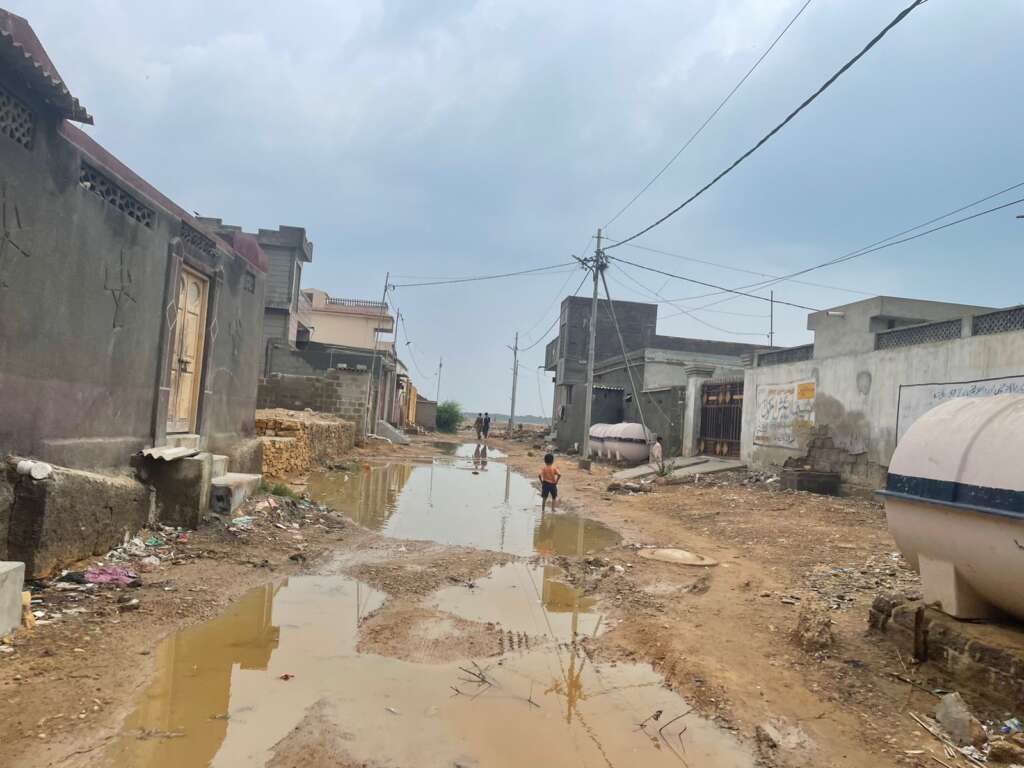
The next day was Eid. For the first time, Sabzi’s family did not celebrate, did not sacrifice a goat. “The grief was too heavy,” she said. Neighbors sent them meat, but the family could not bring themselves to cook it. “Everything was just stinging us.”
After the disappearance of both sons, the family filed an FIR at Mauripur police station on 28 May — Police filed it against [Na Maloom Afraad] unknown persons. A day earlier, on 27 May, they had held a press conference at the Karachi Press Club. They also submitted a petition in the High Court. Since then, police have visited their house three times for “inquiries,” after the FIR and petition.
Sabzi recalled, “Police asked us who told us to file an FIR. I told them, ‘They are my sons, not goats, that we would stay quiet.’” She said the police came three times for “inquiry” — “and each time, they only deepened the pain, like rubbing salt into the wound.”
“There is no qanoon manoon [law] in Pakistan,” Sabzi said with a faint, bitter laugh. “This country is just barbaad [ruined].” She described how each time they travel for a court hearing, they are told only that the date has been moved. “They don’t know in what condition a poor family like us travels to reach there.”
The police, she said, who are supposed to question the agencies about what crime her sons had committed, instead came to her home with their own questions. They asked her daughter, Gul Sida, what kind of masks the armed men were wearing the night her brothers were taken. They even asked how she knew Urdu, since the rest of the family doesn’t. Gul Sida, the youngest, had only managed to complete matriculation.
Sabzi recalled how the police handed her a blank sheet of paper and told her to sign. Since she cannot write, they gave her a stamp instead. But Gul Sida stopped her, pointing out that the paper was empty. The police explained that it was for making a “map” of their house. “A map of our house?” Sabzi laughed bitterly. “I told them this is not a case of land-grabbing. They just came with guns and took my sons. It doesn’t need any map.” She refused to put her thumb on the paper.
“I could only manage to distribute dates worth two thousand rupees for the prayer that my sons be released,” Sabzi said. “I couldn’t afford more. But I have promised that once they return, I will sacrifice the only two goats I have. They are small, but I will cook for everyone and hold a dawat. Because when a person is released from the torture cells, people of the area come to see them. My house too would be crowded, and I cannot let people leave without being fed.”
